'It's Eluned Morgan or me for First Minister' - The Rhun ap Iorwerth interview
I sat down with the man hoping to be leading Wales in a year
Evening everyone,
Special bonus newsletter this week!
At the Plaid conference I sat down with their leader Rhun ap Iorwerth. Given he has characterised the 2026 Senedd election as a direct race between him and Eluned Morgan, it’s really important to properly interrogate the party’s claims and plans.
Plaid have always had the advantage which comes with not having a realistic chance of forming the government. They could put out statements knowing there is little chance they will have to follow through. Now however they may have to.
The difference between campaigning and governing is vast. False hope and promises can slap you hard in the future, just ask UK Labour…
This newsletter is sponsored by Hello Starling. A proudly Welsh company, Hello Starling plan and buy media, backed by data, which is designed to get maximum attention and measurable results. They specialise in getting eyes on your organisation, product and website. If you are looking to get a return on investment, a change in perception, more visitors, more subscriptions, a bigger audience or a happier audience, I highly recommend you check them out here. In doing so you help support this newsletter.
The Rhun ap Iorwerth interview
The format for this will be the same as other interviews in this newsletter:
I will provide the context around the question.
Then Mr ap Iorwerth’s answer.
We will explore his answer to analyse and read between the lines.
Plaid’s balancing act with farmers
I believe one of the big weak spots for Plaid Cymru going into the next Senedd election is the tightrope they are trying to tread with farming communities.
Plaid has gone really hard on Welsh Labour over the Sustainable Farming Scheme, in particular the original plan to make farmers using the scheme have a 10% tree coverage on their land. They have accused the Welsh Gov of a lack of flexibility over tree planting targets and opposed them being mandatory. Instead, they believe that they should be an optional part of the scheme.
The big problem is that Wales is miles off hitting its tree planting targets and without a sustained push from Welsh farmers (over 80% of Wales is managed for agriculture) there is no chance of hitting them. If you are not going to make farmers do it, you need to open the cheque book to incentivise them. But there is simply not likely to be anywhere near enough money in the budget to do it. Environmental groups have expressed their serious concerns over this.
However Plaid Cymru are trying hard to position themselves as a friend and ally of rural communities while simultaneously wanting to maintain their net zero credentials. There is a strong argument to be made that they are ducking the difficult decisions that would need to be made in government in favour of appealing to a rural vote.
I therefore wanted to push him on how he was going to hit that essential tree planting target.
Will Hayward: Should there be statutory tree planting within the Sustainable Farming Scheme?
Rhun ap Iorwerth: We've been very clear that there shouldn't be the setting of a 10% level. We don't think that's the way to do it. I think it's arbitrary. It doesn't work with the kind of farming that we have in Wales. But we absolutely want to encourage the planting of trees.
We will work with the farming communities to grow the right tree in the right place where it works for them and for the environment. So I think it's that arbitrary and statutory setting of targets that we're not comfortable with.
WH: But farmers won't realistically, unless you're going to give them huge financial incentives, plant enough trees. How will Wales hit the Climate Change Committee targets on tree planting?
RaI: But we've had financial incentives for taking environmental measures for a long time in Wales. Lots of farmers that I know well entered environmental schemes such as Glastir, perhaps quite sceptically, but actually found out that it works for them.
Having that quid pro quo has been a norm in the way agriculture has been funded for a very long time.
WH: But we haven't planted enough trees with those schemes. That's the point isn't it? We are miles off the tree planting target.
RaI: There have been hundreds and hundreds of miles of hedgerows planted, for example, because it was hedgerows that were sought to be planted under Glastir. And that's worked well for farmers.
The problem that you had under this scheme that was proposed by the Welsh Government, was that you were saying it has to be 10%. Look at my constituents. You could not grow 10% trees on land on Anglesey, because it's too windy, and you wouldn't want to lose that productivity of land, for example. So there are lots of reasons why 10% is bad, but why encouraging through incentivising the planting of trees is good. The farmers that I know welcome that.
So what can we take from that? Well the first thing to say is that the argument that you can’t plant trees on Anglesey because “it’s too windy” is just rubbish. Ynys Mon’s own council has put out press releases bragging about their own tree planting. If the ancient druids managed to plant oak groves on the island I am sure we can manage in 2025.
The argument that you wouldn’t want to lose highly productive land to tree coverage has more merit. Let’s put aside for the moment the evidence that some tree planting can have huge benefits to soil quality and actually increase yields, there is a point to be made about where we plant trees.
Wales has very limited highly productive farm land. It is mainly in the south and on Ynys Mon. If we are going to plant trees, there is an argument that it should be on the less productive uplands. But then we run into the fact that people working that land are no less attached to it even though it isn’t as profitable.
From a Plaid perspective the point I would make is that there is absolutely a path to net zero without a mandatory tree coverage target in the SFS. However it will involve other difficult conversations and decisions such as significant increase in incentives and more aggressive tree planting on less productive land. I haven’t seen this plan from them. Plaid cannot be allowed to get away with criticising a policy without rigorously showing their workings on how their plan would hit net zero.
Welsh independence…
The biggest mistake that Plaid made in the 2021 was putting Welsh independence at the centre of the campaign. Former leader Adam Price bought high on YesCymru’s popularity and, while their base was thrilled, it actively put people off in the areas of Wales they needed to make gains.
Rhun ap Iorwerth has deliberately tried to put indy in the background of Plaid’s offering and focus everything on displacing Labour. This was exactly what the SNP did in Scotland. They threw all of their energy into replacing Labour as the largest party and then pushed for Scottish independence afterwards.
However, many people are put off voting for Plaid because they don’t personally support an independent Wales and see it as a core Plaid policy. So I asked Mr ap Iorwerth:
WH: Is a vote for Plaid, Cymru, a vote for Welsh independence?
RaI: It's a vote of confidence in Wales. I always describe it as a discussion on reaching Wales' potential. I'm convinced that in order to release that potential, we will need to take that ultimate step. But we're on a journey. It's not going to be a journey that we reach tomorrow.
Is a vote for Plaid Cymru a vote to really try to take Wales places? Absolutely. Is it a vote to make Wales independent tomorrow? It can't. It's not in my gift. It will be in the hands of the people of Wales.
What I want to do is encourage them to engage with the possibilities, to be straight with them about the challenges and to find the path forward. That's what a vote for Plaid Cymru is, to vote about the future of Wales.
From an campaigning stance I think this is exactly what Plaid should be doing. The messaging that they are “pro Wales” rather than “pro Welsh indy” is far more of a vote winner among people who are not already supporters. Not everyone who votes SNP supports Scottish independence and the party have made big electoral gains in the last 15 years by positioning themselves as “standing up for Scotland”.
However, there is no doubt that within the heart of all Plaid’s elected members is an overwhelming desire for an independent Wales. If they were to gain power this drive, especially among their base, will grow. We have seen from the SNP that the focus on indy has often distracted from the job of actually governing.
Labour clearly see indy as Plaid’s main weak spot. Here are a post by the Welsh Labour Secretary of State for Wales Jo Stevens during Plaid’s conference:
Similar stuff was posted from the Welsh Labour account:
Personally, I find this sort of post a bit cringey and weak but it clearly shows that Labour are planning on fighting Plaid around independence rather than falling back on their own record. This is the reason why Rhun ap Iorwerth is so keen to not have independence as a prominent part of his party's offering.
What’s the point of the Future Generations Act?
Back in 2015 the Well-Being of Future Generations Act was brought in to make sure that the future well-being of people in Wales underpinned all decision making. There is, in my view, an argument to be made that it has mainly been a way for the successive Welsh Governments to brag about how “groundbreaking” and “world leading” they have been by introducing it.
To be clear, I am not criticising the existence of the legislation, simply that I believe that public bodies in Wales have paid lip service to it. Given that outcomes across so many areas of Welsh life are declining or stagnant, I asked the Plaid leader:
WH: Has the Wellbeing of Future Generations Act improved the lives of people in Wales in any meaningful way?
RaI: It’s a really good question. I don't think it is delivering what it could. We talk often, don't we, about the world looking to Wales with envy and having a Wellbeing of Future Generations Act in place. I agree with that. It's really important that it is there.
Have we seen it make a difference? I don't think we have yet. I think the principles that are upheld by that legislation is really, really important. What I'm not convinced about is that government decisions actually change, or are influenced in a large way by measuring themselves against that.
Hard to argue against this point to be fair. Though Mark Drakeford did cite the act as one of the principle reasons for cancelling the M4 relief road I have seen precious few occasions where the legislation has truely underpinned and guided the behaviour of public bodies.
If you need any evidence of this just read the newsletter from a few weeks ago which showed how almost half of them haven’t followed through on their legal duty to publish biodiversity plans.
Though I also wonder how any potential Plaid Government will square the circle of both following the Future Generations Act while falling short of tree planting targets…
Changes to plans to curtail second homes?
As part of the cooperation agreement between Welsh Labour and Plaid Cymru, measures were introduced to make second home ownership in Wales less appealing. The main element was allowing local authorities to charge huge amounts extra on council tax for second homes.
Another strand was to close a loophole where second home owners could categorise their home as a business, so as to pay the much lower business rates. This rule that in order to be classed as a business, properties needed to be let out 182 days a year.
This is a really high bar. If a property was let every day during the three summer months and every weekend through the year, it would still fall short. This meant that lots of legitimate businesses were hit by the change. I therefore asked Mr ap Iorwerth:
WH: Would you consider reducing the 182 day limit? I've interviewed legitimate businesses which have been caught up in that.
RaI: Okay, I'll be honest with you, I have always thought that 182 days is on the high side. I'm very, very supportive of the suite of actions that have been put in place to answer a very important question. But I'm a pragmatic politician as well.
I want to make sure that measures put in place by government aren't punitive, and they're actually there for a reason. And I've always been of that opinion, while very much supporting making sure that the legislation does what it needs to.
WH: So would you consider changing it?
RaI: Yes.
The damage caused to some rural and coastal communities by second homes is unequivocal and this is a HUGE issue for many Plaid voters. You can see in his response that he is ultra careful to make clear he supports the curtailing of second homes, while admitting that this part of the legislation may have been a bit harsh.
Wales a Nation of Sanctuary?
In 2019 Welsh Government said Wales would become the world’s first ‘Nation of Sanctuary’ (a country of welcome for asylum seekers and refugees) and developed a Nation of Sanctuary - Refugee and Asylum Seeker Plan. This plan covered a wide range of commitments which could improve outcomes for newly arrived refugees and asylum seekers in Wales.
In September 2023, the plan was relaunched and subsumed in the Anti Racist Action Plan. Despite the commitments, the new plan is vague, lacking targets and measurable outcomes. Many elements of the plan are unfunded.
It is a source of endless frustration that the Welsh Government has seemingly just paid lip service to these important issues. At a time when there is a lot of far-right rhetoric seeping into mainstream political discourse you need a Government that actually acts to improve lives, not just makes bold statements that they don’t back up with action.
Plaid has previously been supportive of the Nation of Sanctuary vision, particularly against the anti-immigration stance of Reform and the Conservatives. UK Labour have been quite hardline on immigration as well and I know from conversations with people within Welsh Labour that Eluned Morgan is not particularly inclined to put much energy behind the antiracism action plan and instead wants to focus on the NHS and growth.
I therefore asked the Plaid leader:
WH: Under a Plaid Cymru government, is Wales still a Nation of Sanctuary, and what if anything, does that mean?
RaI: It's a really interesting question. And I think people think a Nation of Sanctuary means opening doors to everyone and anyone in a limitless way. That is not what a Nation of Sanctuary is. What a Nation of Sanctuary is, is saying for those people who will always try to escape persecution, those who need to escape war, “if you come to Wales, if that's where you end up, you will find that we will take care of you, as is required of us by international law”.
That is what a Nation of Sanctuary is, and it stands in contrast with the hostile environment that people are experiencing on a UK level. It's not a totally unlimited, open door. It's how we look after the people that come here, and yes, I believe that Wales should be proud of making sure that we play our part in the international obligations to make people feel safe when they, for example, flee war and end up here.
This is definitely less strong than the current commitment from the current Welsh Gov. A Nation of Sanctuary is more than international legal obligations - it's about making sure sanctuary seekers not only survive but thrive with the tools they need to build lives in their new homes.
He has recognised the hostile UK environment but not the multitude of devolved areas where the Welsh Government impact on the lives of people seeking sanctuary- health, transport, education, housing (this only applies for refugees as asylum housing is with the UK Gov). It's also about enabling communities across Wales to be resourced to provide that welcome.
Overall there is no real thought or clarity on what they will actually do in this space.
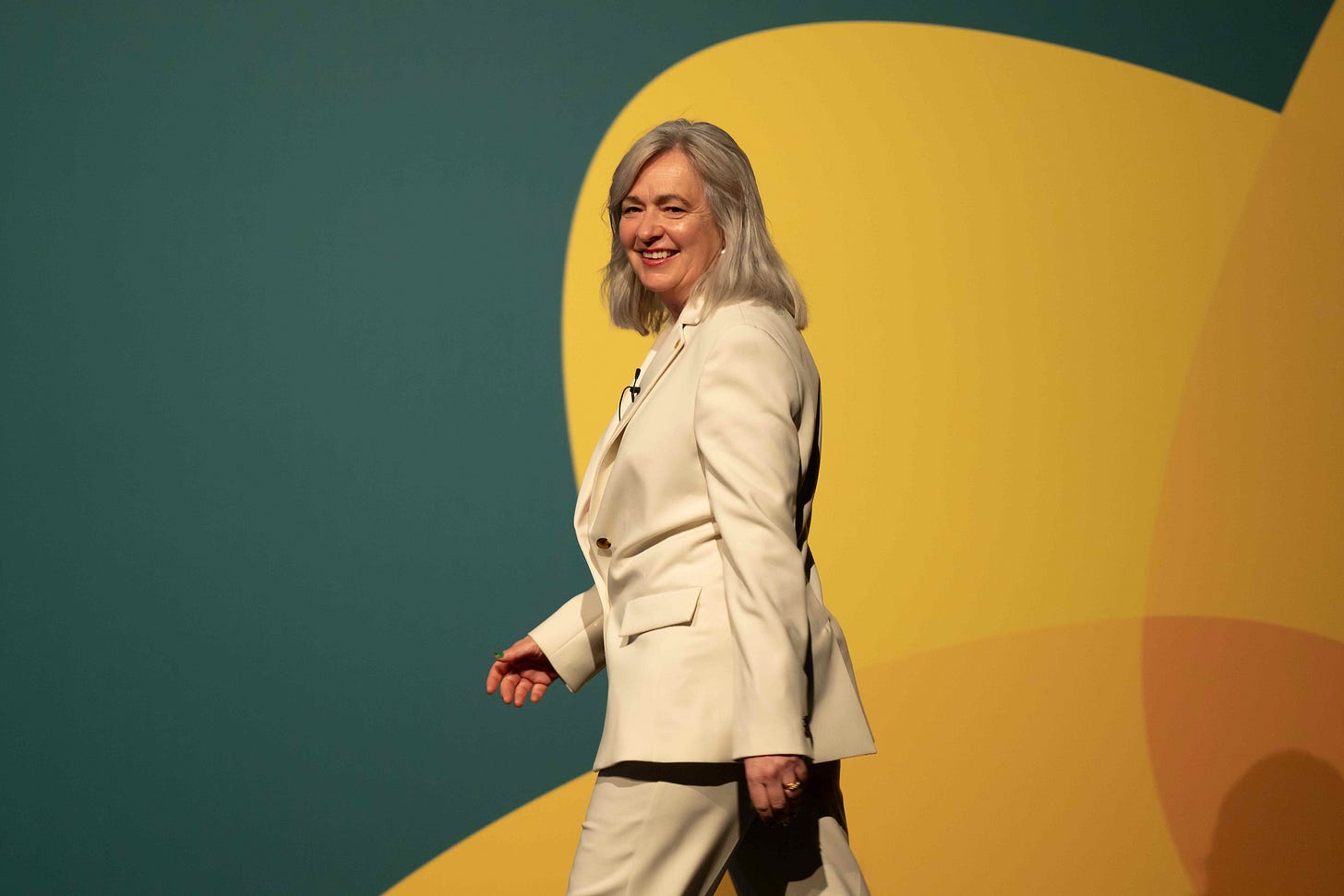
Can Plaid win over Reform voters?
Last year this newsletter looked at the voting trends compiled by Cardiff University’s Wales Governance Centre from the General Election. It showed that most of the people moving to Plaid came from Labour. Very, very few came from Reform. This begs the question:
WH: Is the overwhelming target for Plaid disgruntled Labor voters? How do you win over somebody who was inclined to vote Reform or Conservative? Is it possible for Plaid to win their vote?
RaI: I think it is. We've seen what the research tells us, and we know that there are many shared values between what Plaid Cymru stands for now and what Labour used to stand for. That's why so many people have already started making the journey over to Plaid Cymru and more are projected, according to pollsters, to make that journey.
But when I speak about the seriousness with which we want to govern and the detail with which we're putting into explaining what that Plaid Cymru government will do - I'm trying to inspire people about how we would go about governing Wales.
Absolutely, I'm hoping that we can make people who, perhaps have not thought of Plaid Cymru before but who recognize that we need to change, but will have a look in our direction.
If you think that in realistic terms, it's Eluned Morgan as First Minister, or me as First Minister, leading the government and setting a new tone for government. That's the realistic option.
I ask people to focus on what that leadership can look like. Now, there are people who have perhaps been entertaining the idea of voting Reform because they are frustrated at what UK politics has become. Goodness me, I'm frustrated at what UK politics has become as well!
I'm frustrated at that sort of ding dong, the merry go round, whatever you want to call it, of blue and red, which time and time again doesn't get to grips with the issues that are important in our community. Well Plaid Cymru offers that with vision and with a plan for government, Reform doesn't do that.
I know that is quite a beefy response but I have kept it in full because I think there are several insights we can take from it:
“What Plaid Cymru stands for now, and what Labour used to stand for”. This is very revealing of Plaid’s strategy. It is targeting those Labour voters who were desperate to oust the Tories and now feel that UK Labour are a Tory-light party. They are trying to get those feeling politically lost on the left to find a new home.
“It's Eluned Morgan as First Minister, or me as First Minister”. Firstly, there is absolutely a scenario where there could be a Reform First Minister. It isn’t the most likely scenario but it could happen. Secondly, this is the boldest I have heard him be. There is clearly a growing confidence within Plaid.
“Goodness me, I'm frustrated at what UK politics has become as well!”. Plaid obviously wants to make a strong case for being the next governing party. You can see this in how they have put forward plans for the NHS etc. However they are also trying to make themselves appealing as a protest vote for people who are simply frustrated with the status quo and politics in general. This is something Reform have based their entire MO on, and Plaid are trying to emulate that.
Thanks for reading. If you value this sort of journalism, please subscribe and share it. Without you, I can’t do this.
Take care
Will





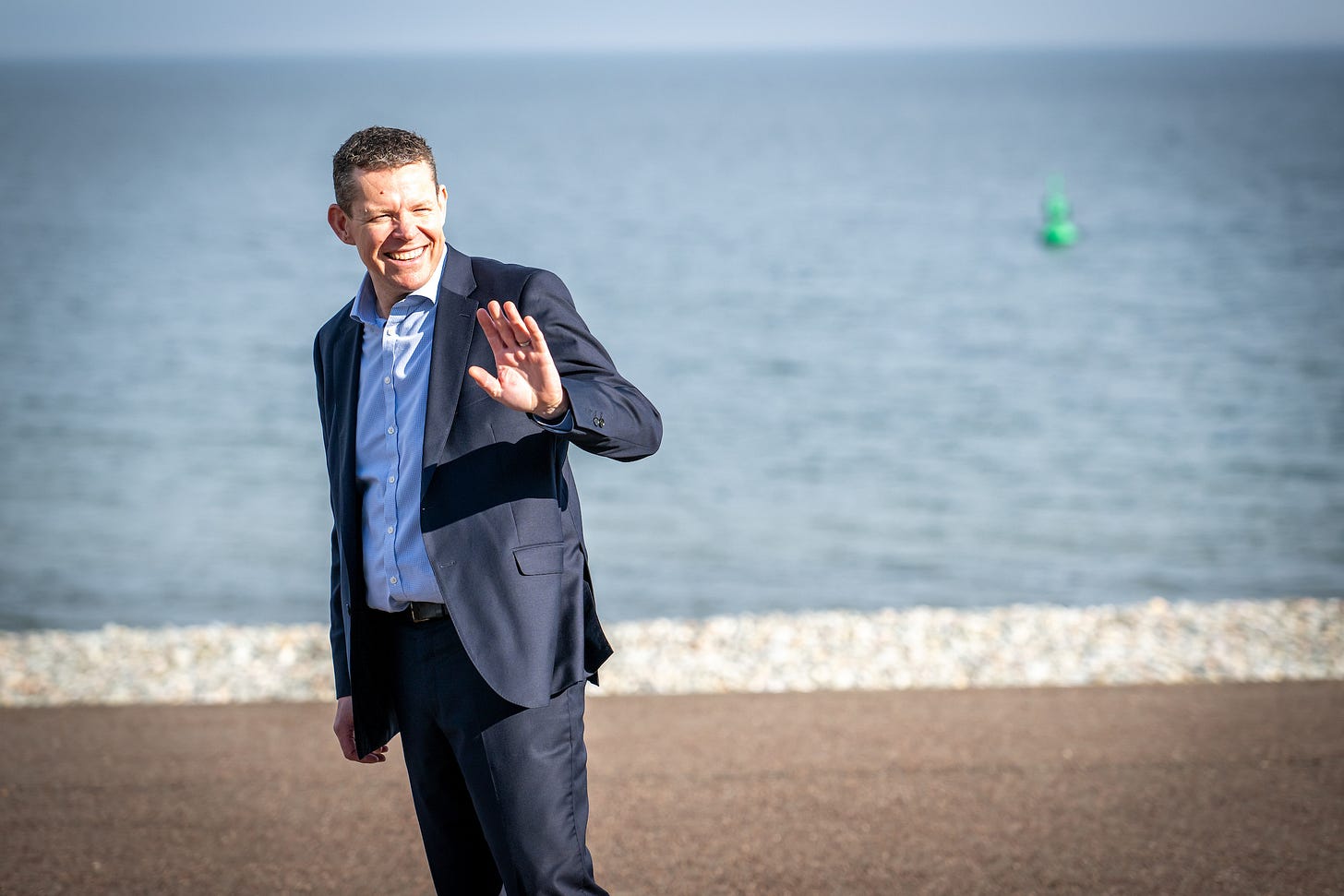
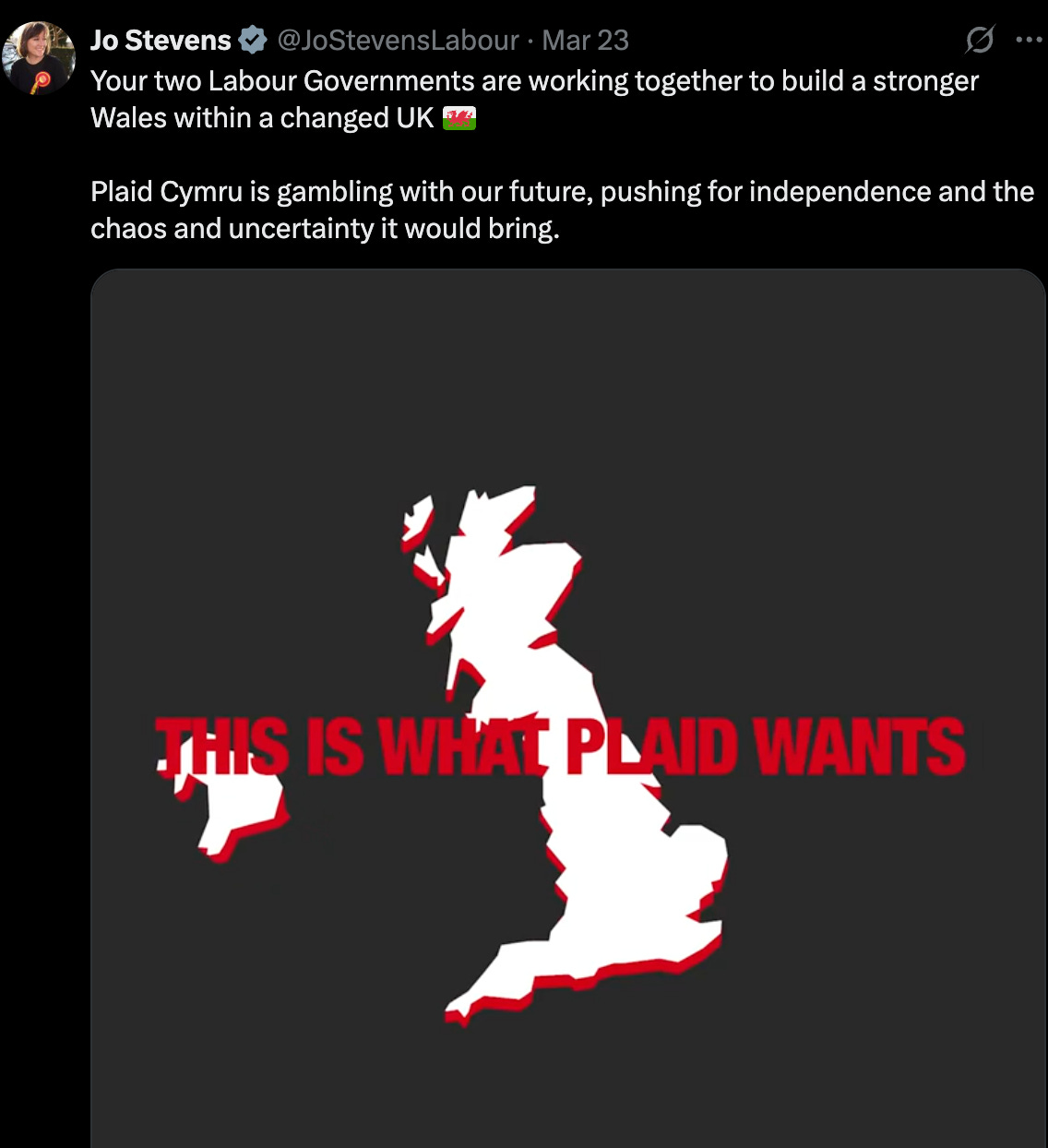
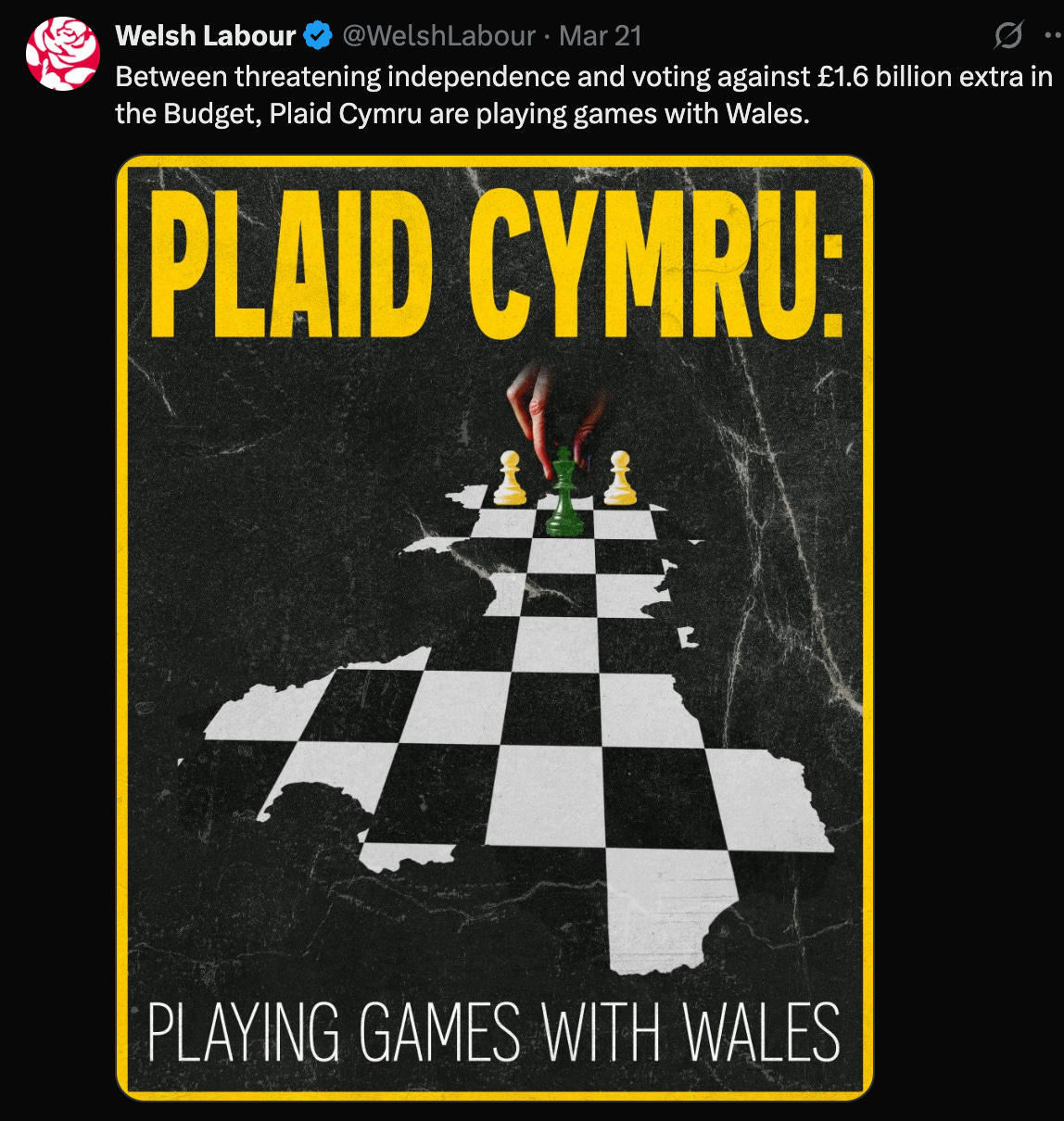
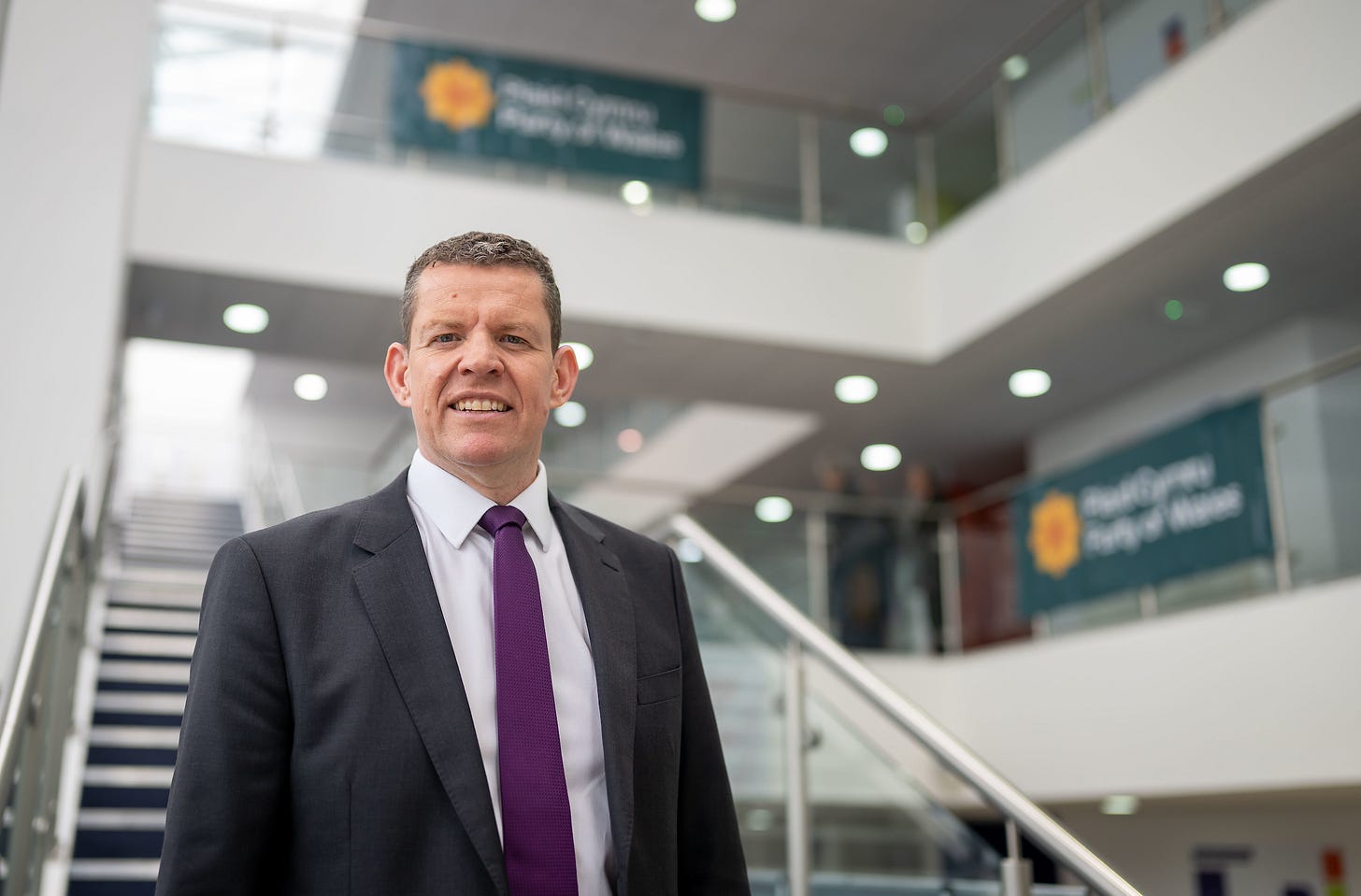
Why the obsession with tree planting? There are other, and better, ways of getting carbon fixation. Peatlands are much more effective in this respect. It makes no sense to plant trees on peatland, or other moorland. Much of Wales is covered by such vegetation. Planting conifers (which many seem to do) is ecologically detrimental, They really destroy otherwise healthy soils. There is no consideration given to fungal species - essential for healthy biodiversity. Because of our climate, the timber you get from conifers is not of much use either. Planting native hardwood along hedegrows around fields can be beneficial without harming productive farmland, Tree planting as a solution is far too simplistic and will not work. What is needed is an intelligent dialogue between scientists and farmers in order to optimise each area. Every valley in Wales is different, with different ecological needs. Politicians need to provide this interface, which I think is what Rhun is suggesting.
There is quite simply nobody putting in the work like you, Will. With things as they are I'd be voting Plaid in 2026 but if they send someone door to door I'll be keen to discuss their farming strategy. I wonder if a pact with the Greens might have them leave Cardiff seats like mine (and perhaps Newport) alone in return for running unopposed outside the South East.